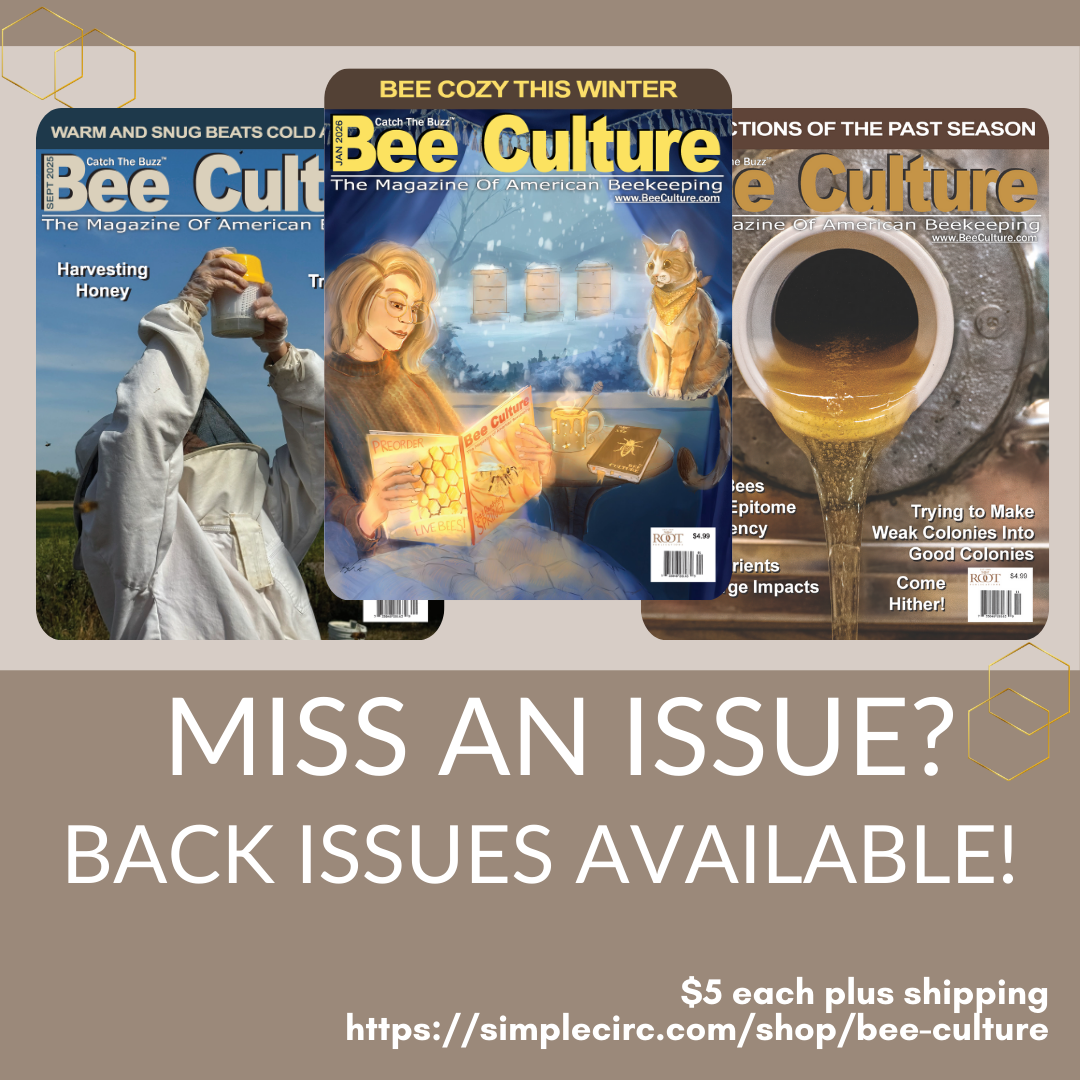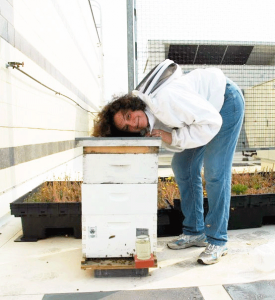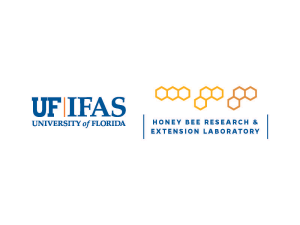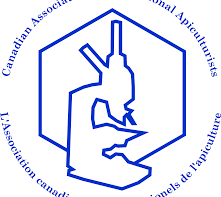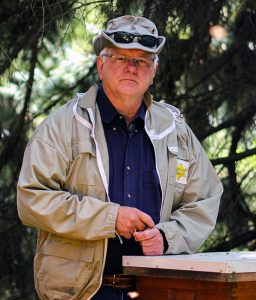Getting Sweet With Adults
By: Toni Burnham
Most clubs have done a version of a public honey harvest at one time or another – at a county or local fair, for example – and have seen first hand the power of watching frames turn into bottled gold for people who might be too afraid to interact directly with bees. This is essentially an educational or “friend raising” activity of great value for the ongoing understanding of bees and acceptance of beekeepers in polite society. In an article just past, we talked about why and how to set up honey harvest events directed specifically at young people. This time, I wanted to show you how we sometimes re-engineer these events specifically to meet additional goals, such as outright fundraising, building community partnerships, creating shared apiary sites on valuable sites (that we don’t own), and creating benefits for members of our community who are also doing important service.
Unlike kids’ events, there is usually significant money on the table for this one, so everyone needs clear goals and expectations.
We’ve done this a bunch of times, but the examples we have space for here are: an event we have held for six years at a five-star hotel, a nine-year gig at a local monastery, our four years at a historic cemetery, and a brand-new session that benefits an urban agriculture non-profit serving our veterans (as well as the expanded greening program of a major hospital). We are in other places, too, like food banks and rec centers, so don’t limit your imagination, either.
Please note, in all of these cases, someone is donating some honey, or just paying it as rent for use of a site. You may be able to set up another deal (for instance, offering hive tours for a silent auction–which can raise an insane amount of money).
Prepping for A Grown Up Honey Harvest
In each case where we hold a honey harvest, we have negotiated an out apiary agreement with the site where the event takes place: this is because most of our partnerships have evolved with the opening of new sites for new beekeepers. It doesn’t have to be this way. If your club has an ongoing relationship with a meeting site (like a nature center, for example) this could be another way to seal the deal, or score free meeting space. The main point is that maximum value comes from doing this in the course of an ongoing relationship. In my opinion, this is too much of an investment for a one-off event.
Your partner is going to want to sell much of what is harvested: think about bottles and labels, who provides them, and who pays. The money is on their end. Let them also manage who is invited, how it is publicized, and how much is paid to attend (if anything) and the price of honey to take home. Inform them up front of how many beekeepers will be in the room, and whether you will be bringing additional frames for harvest that will go home with the beekeepers, not the institution. They should be pleased with the latter: the more frames there are to harvest, the more folks they can invite to participate.
Make sure you know how many are coming: this allows you to bring enough uncapping tanks, tools, and activities. I like to have at least two bottling buckets and stainless steel filter sets so we can begin bottling by mid-session. Yes, I know there will be foam, and this will not be state-fair-quality product. It’s OK.
Things in the room can be slow when getting started (before there is an extractor to crank, or honey to bottle). Ask them to provide refreshments, and consider providing a beekeeper with a demo hive to take questions. We sometimes assign folks to sticking labels on empty bottles. A honey tasting from different years and different parts of the area is often appreciated. If it is daytime, bring a beekeeper volunteer to escort groups out to see the hives on site (this is really powerful: connecting the honey all the way back to the green space).
In each agreement, we establish on what basis and how much honey we donate, usually how much per-hive onsite with early notice of particularly bad harvest years (like 2016 in DC). If we can’t harvest at a long term partner, we try to deliver additional value, like participation in public programs onsite or donating other products such as beeswax soaps/lip balms, etc.
We prefer to harvest in inspected, food safe locations in order to maximize cleanliness and later salability of the product. Most large institutions have a kitchen that meets the standard. If not, bring your drop cloths, make sure there is a sink (non-negotiable), and have a plan to evacuate sticky stuff to a place where you can really clean up. A first aid kit is not out of line where hot knives and uncapping forks are available. Almost all sites have them.
Sweet Examples
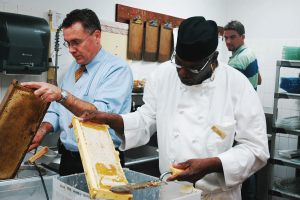 At the Fairmont Hotel, we taught chefs Ian Bens and Aaron Weber how to manage on site hives starting in 2009. This was a patently obvious attempt to land a major commercial partner with a major commitment to the environment (and a large legal department) during our long-term effort to more widely legalize beekeeping in DC. They only had three hives, and they could not harvest until 2010, so the next year, they invited the DC Beekeepers to do a community harvest with them in a completely certified commercial kitchen. It offered something exceptionally groovy: a commercial dishwasher capable of handling a partially disassembled extractor. We used this event to show first year beekeepers how to harvest, and to give our more experienced beeks an efficient method to quickly get extracted honey, and to have that honey eligible for sale anywhere in the city. Those beeks brought their own bucket and bottled on their own time. The Fairmont got their honey harvested with no additional staff cost or delay, and tons of press pictures that hit their Facebook and Twitter streams, as well as other media in support of their corporate greening program (which is for real). The Fairmont wanted their honey in a bucket (which they provided) and which was used in the kitchen for as long as it lasted. Last year, they partnered with DC Donuts for a special promotion afterward.
At the Fairmont Hotel, we taught chefs Ian Bens and Aaron Weber how to manage on site hives starting in 2009. This was a patently obvious attempt to land a major commercial partner with a major commitment to the environment (and a large legal department) during our long-term effort to more widely legalize beekeeping in DC. They only had three hives, and they could not harvest until 2010, so the next year, they invited the DC Beekeepers to do a community harvest with them in a completely certified commercial kitchen. It offered something exceptionally groovy: a commercial dishwasher capable of handling a partially disassembled extractor. We used this event to show first year beekeepers how to harvest, and to give our more experienced beeks an efficient method to quickly get extracted honey, and to have that honey eligible for sale anywhere in the city. Those beeks brought their own bucket and bottled on their own time. The Fairmont got their honey harvested with no additional staff cost or delay, and tons of press pictures that hit their Facebook and Twitter streams, as well as other media in support of their corporate greening program (which is for real). The Fairmont wanted their honey in a bucket (which they provided) and which was used in the kitchen for as long as it lasted. Last year, they partnered with DC Donuts for a special promotion afterward.
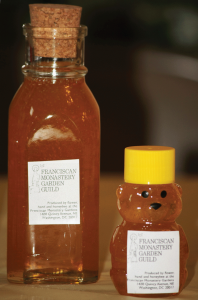 At the Franciscan Monastery, they had bees decades ago, but still had a going vegetable and Bible garden with so-so yields. The volunteer Garden Guild asked us if we would set up hives in 2006, and most years since 2007 we have had a significant public harvest there. Over the years, the 20+ acre grounds have become home to six beekeepers (+/-) and we have been given room to grow this year. This is also where we bring bee trees to disassemble and hive. The Garden Guild sells tickets, usually about $15 each, to the public, brings them into their certified site to harvest, and sends them home with jars from three ounce to eight ounce, depending on the yield. There is an option to buy right at the session, but most of the honey is sold in the Monastery Gift shop in small bears: this has profound meaning to many of the site visitors, and is completely in line with their mission of linking religious values to all natural life. It’s an important source of funds for the Garden Guild to maintain the site, too.
At the Franciscan Monastery, they had bees decades ago, but still had a going vegetable and Bible garden with so-so yields. The volunteer Garden Guild asked us if we would set up hives in 2006, and most years since 2007 we have had a significant public harvest there. Over the years, the 20+ acre grounds have become home to six beekeepers (+/-) and we have been given room to grow this year. This is also where we bring bee trees to disassemble and hive. The Garden Guild sells tickets, usually about $15 each, to the public, brings them into their certified site to harvest, and sends them home with jars from three ounce to eight ounce, depending on the yield. There is an option to buy right at the session, but most of the honey is sold in the Monastery Gift shop in small bears: this has profound meaning to many of the site visitors, and is completely in line with their mission of linking religious values to all natural life. It’s an important source of funds for the Garden Guild to maintain the site, too.
In nine years, we have hit some bumps, but the long term relationship helps. It is really important to maintain regular communication with the rotating roster of volunteers who staff and lead the Garden Guild. Incoming officers may not understand the deal, or may not know that honey harvests are not predictable year-to-year. It is important that site beekeepers value the opportunity much more than many other sites: the monks actually live here, and religious pilgrims walk the grounds in meditation. Messy or ill-tended hives must not be allowed to persist. Inconsiderate beekeepers must get the boot. Right away.
Historic Congressional Cemetery Apiary
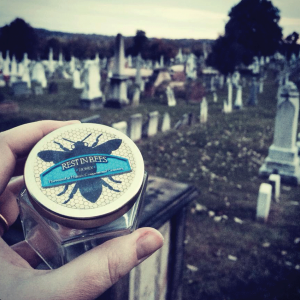 It took us over 10 years to get on the grounds here, and we probably have goats to thank. This site was struggling financially for years, until they managed to market themselves as a dog-walking and green burial location. They brought in Eco-Goats to help with pesticide-free landscaping: munching away invasives and inviting the public to watch. This made the local and national news. I had been a dog walker there for years, and had participated in a number of fundraising events: so I said, “Hey!”
It took us over 10 years to get on the grounds here, and we probably have goats to thank. This site was struggling financially for years, until they managed to market themselves as a dog-walking and green burial location. They brought in Eco-Goats to help with pesticide-free landscaping: munching away invasives and inviting the public to watch. This made the local and national news. I had been a dog walker there for years, and had participated in a number of fundraising events: so I said, “Hey!”
In our second year, we pulled three supers of honey and made $5,000 for this site. Several local club members had to bring their frames to have enough to do, but Cemetery users paid $35 each to do our work and bring home a four-ounce hex jar, with an opportunity to buy additional jars for $20 each. The “class” sold out in 36 hours, the honey in a couple of weeks.
We are very welcome at Congressional Cemetery.
The historical tours mention us, the dog walkers say “Hi,” we bring extra veils so the adventurous can join us in impromptu inspections (in reality, actually selfie-production opportunities). Each one of them goes home and tells at least ten friends, and who knows how many followers, how cool urban bees are.
They can have the three supers. The six other beekeepers here will be kicking in next year.
Bees for Vets
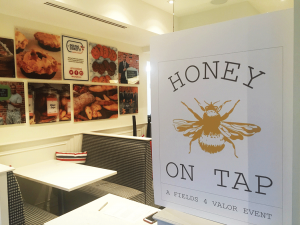 The year before last, our short course included a returned Iraq War vet, who also joined our Swarm Squad. He is a devoted urban gardener, and started a non-profit called Fields 4 Valor (http://fieldsforvalor.org/). The group helps former military, including those managing PTSD, by growing food as a positive activity, and in turn sharing the harvest with 50 former service member families in need. They asked us to help find them an apiary to add to the garden this year. Funny thing was, Sibley Hospital had asked us to set up bees on their new green roof, and it was way too much of a pain for me to drive 45 minutes each way to do so. Also, this is no spot for rookies or dilettantes.
The year before last, our short course included a returned Iraq War vet, who also joined our Swarm Squad. He is a devoted urban gardener, and started a non-profit called Fields 4 Valor (http://fieldsforvalor.org/). The group helps former military, including those managing PTSD, by growing food as a positive activity, and in turn sharing the harvest with 50 former service member families in need. They asked us to help find them an apiary to add to the garden this year. Funny thing was, Sibley Hospital had asked us to set up bees on their new green roof, and it was way too much of a pain for me to drive 45 minutes each way to do so. Also, this is no spot for rookies or dilettantes.
Fields 4 Valor is new and cash-poor (though vegetable-rich) and decided to try a honey harvest to both raise money and put sweet stuff in the basket for their families. They had an existing relationship with the Dog Tag Bakery, which has a fellowship to train returning vets in the culinary biz. I had plans to send a couple of supers to the Maryland Honey Harvest Festival of the Maryland State Beekeepers Association for extraction demos the weekend before, so we donated that honey for bottling and sale. Fields for Valor had three supers of their own to uncap and spin (because they started with massive splits early in the season). Folks bought tickets for $40, the honey is not yet on sale, but they already have $4K in their pockets. The garden will be bigger next year.
So let’s count up the happy people here: veteran volunteers, families in need, a major hospital, the MSBA, a local pro-community business, and all the people who came and feel good about themselves and the stuff they will put in their tea for the next few weeks. How else can you do this??
There’s so much about beekeeping that builds virtuous circles – if you’re a beekeeper who reads this magazine, you already know how it broadens and deepens your life in the world and in the spirit. If honey bees are the great ambassadors of the wide pollinator family, this is their calling card. And people are happy to offer their support – in space, kind, cash and friendship – for this worthwhile effort.
Toni Burnham keeps her bees and helps educate and mentor local beekeepers in the DC area.



